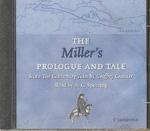|
This section contains 837 words (approx. 3 pages at 300 words per page) |

|
Re-read the Ending of the Miller's Tale. How Far Do You Consider It to Be a Satisfying Conclusion?
Summary: --------------------------------------------------------------------------------
Following its fast, action-packed pace, "The Miller's Tale" climaxes with a series of causes and effects and ends rather abruptly with Chaucer's short summary on the sequence of events. On one hand the brusque ending of "The Miller's tale" is appropriate to the nature of The Miller himself, we know him to be a drunk, rude man who, "abide no man for his curtsies," and this ending seems to reflect that behaviour. However on the other hand, as the reader, do we feel "The Miller's Tale," is missing an imperative moral?
Following its fast, action-packed pace, "The Miller's Tale" climaxes with a series of causes and effects and ends rather abruptly with Chaucer's short summary on the sequence of events. On one hand the brusque ending of "The Miller's tale" is appropriate to the nature of The Miller himself, we know him to be a drunk, rude man who, "abide no man for his curtsies," and this ending seems to reflect that behaviour. However on the other hand, as the reader, do we feel "The Miller's Tale," is missing an imperative moral"
In "The Miller's Prologue," Chaucer intervenes in his own voice to remind the audience the Miller is a "cherle," and if they want "gentilllesse," "moraralitee" and "holinesses," they should "turne over the leef," and choose a different tale that would suit their taste. Through distancing himself from the tale, Chaucer shows he has no didactic purpose for...
|
This section contains 837 words (approx. 3 pages at 300 words per page) |

|


